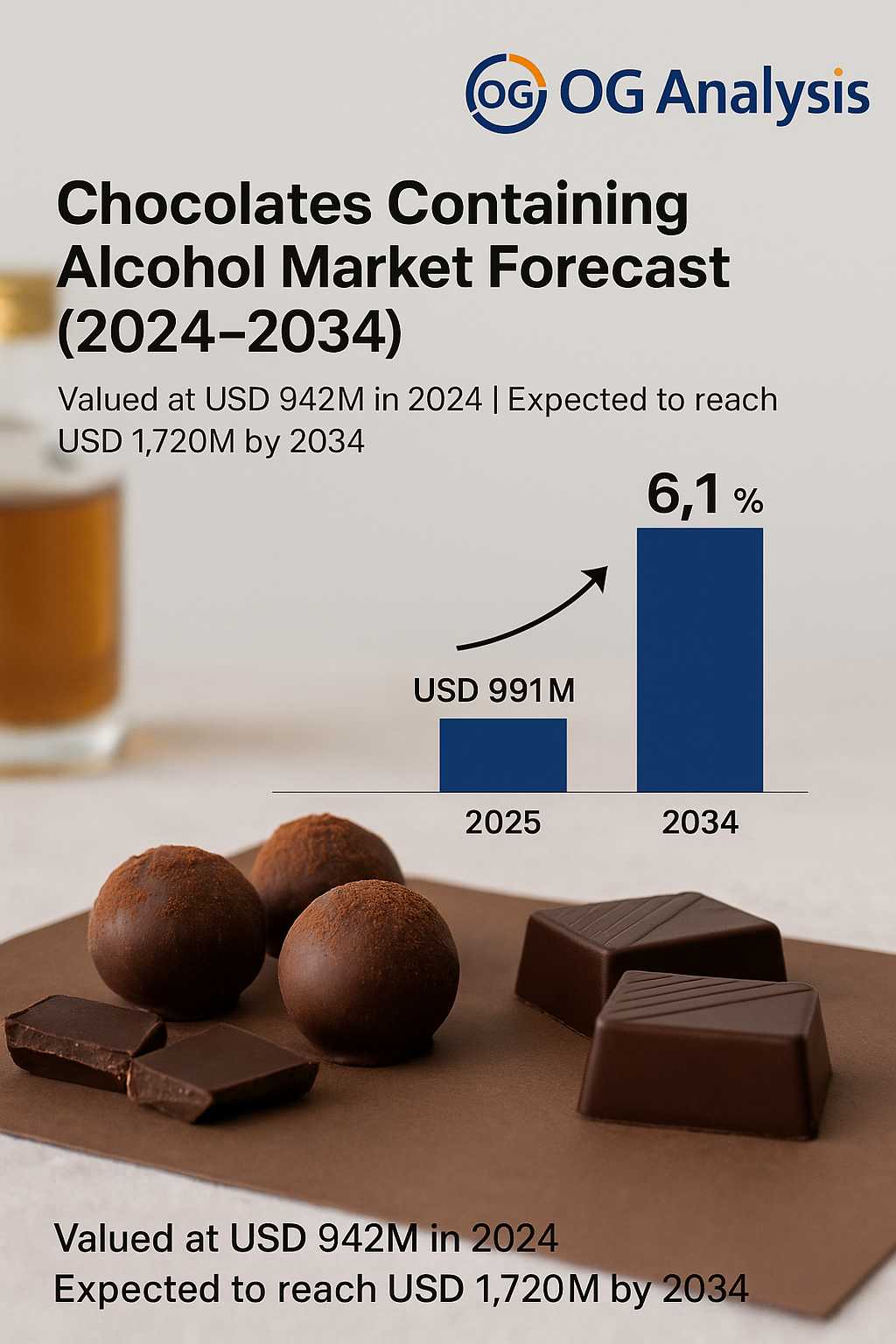Why Chocolates Containing Alcohol Are Becoming the Indulgence of the Decade
Once a seasonal novelty, chocolates containing alcohol have carved a lasting place in the hearts—and taste buds—of global consumers. These decadent treats, blending the richness of fine chocolate with the sophistication of liqueurs and spirits, have become a favorite for gifting, self-indulgence, and gourmet experiences. In 2024, the global market for these treats was valued at USD 942 million, with a projected increase to USD 991 million in 2025. By 2034, this market is expected to soar to USD 1,720 million, reflecting a robust CAGR of 6.1%.
From rum-filled truffles to wine-infused bars, the category has evolved from a luxury niche into a mainstream sensation, thanks to rising premiumization trends and the growing appetite for experiential food. The market is driven by festive seasons, rising disposable incomes, and an increasing preference for multi-sensory products that cater to both chocolate lovers and spirit connoisseurs alike.
1. Are chocolates containing alcohol the new gourmet status symbol?
As consumers seek unique and luxurious flavors, alcohol-infused chocolates have become a culinary flex. Limited-edition spirit collaborations and regionally inspired liqueur flavors are elevating chocolate gifting to an art form.
2. How are millennial and Gen Z palates redefining the market?
Younger demographics are driving the shift toward adventurous and unconventional flavor profiles. From mezcal truffles to gin-tonic bonbons, this cohort is seeking bold, Instagram-worthy combinations that blend fun and sophistication.

3. Will alcohol-infused chocolate bars replace traditional liquor gifts during the holidays?
Chocolates containing alcohol are rapidly becoming go-to gifts, especially in festive seasons like Christmas, Valentine's Day, and New Year's. Their premium packaging, delightful taste, and novelty appeal make them ideal alternatives to wine bottles and spirit boxes.
Click Here for the Full Market Report
4. How are sustainability and craftsmanship influencing brand preferences?
With the rise of eco-conscious consumerism, brands that emphasize artisanal production, ethical sourcing of cacao, and organic liqueur infusions are gaining traction. Transparent storytelling is now as important as taste.
5. Is eCommerce sweetening the growth curve for this market?
Yes! Online platforms are expanding reach for luxury and niche chocolatiers. With customizable boxes, gift sets, and subscription models, brands are tapping into digital gifting trends and convenience-driven purchasing.
6. How do cultural differences influence flavor innovation?
While Europe loves its classic liqueurs like Grand Marnier and Cognac-filled pralines, Asia-Pacific markets are experimenting with sake, soju, and local rice wines. Regional alcohol preferences are shaping chocolate innovations globally.
7. Could alcohol-chocolates go mainstream in the wellness space too?
Interestingly, brands are flirting with the idea of low-alcohol or adaptogen-infused chocolates for “mindful indulgence.” Think dark chocolate with botanical spirits that offer relaxation or mood elevation without over-intoxication.
Click Here for the Full Market Report
Segmentation Overview: Understanding Market Structure:
By Type:
-
Wafers
-
Blocks
-
Liquid
-
Other
By Flavour:
-
Classic Liqueurs
-
Wine-Based
-
Spirit-Infused
-
Other
By Packaging:
-
Individual Chocolates
-
Gift Boxes
-
Bars
-
Novelty Shapes
By Distribution Channel:
-
Offline
-
Specialty Stores
-
Online
By Geography:
-
North America (USA, Canada, Mexico)
-
Europe (Germany, UK, France, Spain, Italy, Rest of Europe)
-
Asia-Pacific (China, India, Japan, Australia, Rest of APAC)
-
The Middle East and Africa (Middle East, Africa)
-
South and Central America (Brazil, Argentina, Rest of SCA)
Leading Brands in the Global Chocolates Containing Alcohol Market:
-
Lindt & Sprüngli AG
-
Godiva Chocolatier, Inc.
-
Läderach
-
Ghirardelli Chocolate Company
-
Cadbury (Mondelez International)
-
Ferrero Rocher
-
Pierre Marcolini
-
Neuhaus
-
Chocolat Bonnat
-
Maison du Chocolat
-
Amedei
-
Valrhona
-
Scharffen Berger
-
Ethel M Chocolates
-
Toblerone (Mondelēz International)
Explore More Industry Insights:
| Global Bakery Filling and Toppings Market Outlook Report |
Connect with us on:
Phone: +91 888 64 99099
Email: mailto:sales@oganalysis.com
Learn More about OG Analysis
OG Analysis, established in 2009 has 14+ years of experience and served 1800+ clients from 980+ companies operating in 54+ countries. OG Analysis is a leading provider of market research reports in Chemicals, Energy, Oil & Gas, Food & Beverage, Electronics & Semiconductors, Automotive, Telecommunication, Healthcare and Other industries.